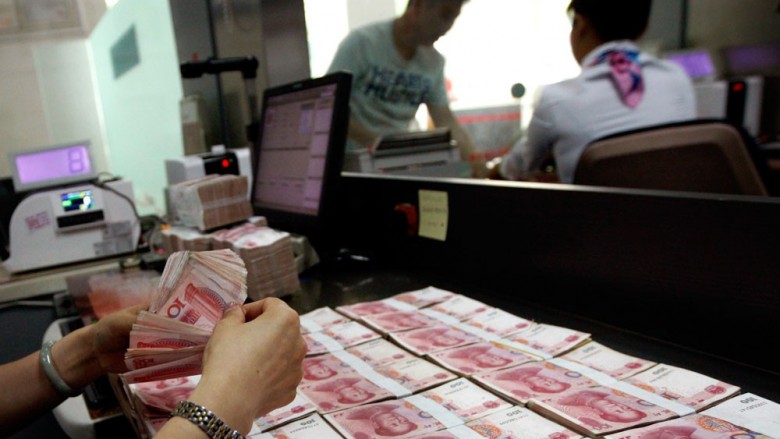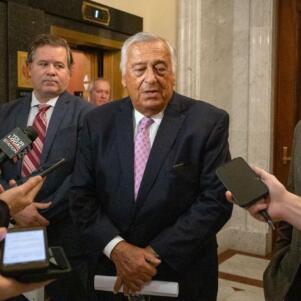US lawmakers quick to criticize China on currency drop
By Associated Press | August 13, 2015, 12:32 EDT
 In this Tuesday, Aug. 11, 2015 photo, a bank clerk counts Chinese currency notes as her colleague attends a customer at a bank outlet in Huaibei in central China’s Anhui province. China’s surprise move on Tuesday to devalue its currency has intensified concerns about a slowdown in the world’s second-largest economy, whose growth rate has reached a six-year low. It is also fanning tensions with the United States and Europe, whose exports could become comparatively costlier. (Chinatopix via AP)
In this Tuesday, Aug. 11, 2015 photo, a bank clerk counts Chinese currency notes as her colleague attends a customer at a bank outlet in Huaibei in central China’s Anhui province. China’s surprise move on Tuesday to devalue its currency has intensified concerns about a slowdown in the world’s second-largest economy, whose growth rate has reached a six-year low. It is also fanning tensions with the United States and Europe, whose exports could become comparatively costlier. (Chinatopix via AP) Written by Matthew Pennington
WASHINGTON (AP) — U.S. lawmakers have been quick to condemn the sudden drop in the value of Chinese currency as damaging for American businesses and workers, reviving an issue that once was one of the biggest sources of tension between the two world powers.
Yet the initial response from the Obama administration officials has been mild, even positive. They say Beijing has indicated it is taking steps toward market-determined exchange rate —something that even China’s biggest critics in Washington have been demanding for years.
While China’s currency policy has been a perennial sore spot in the relationship, it has dropped in the pecking order of priority concerns during President Barack Obama’s tenure, as the yuan has appreciated significantly against the U.S. dollar since 2010.
China’s territorial ambitions in the seas of East Asia and alleged cyber spying on a massive scale against U.S. government and businesses are likely to dominate the agenda when Chinese President Xi Jinping makes his first state visit to the United States in September.
But a continued drop in the value of the yuan against the dollar could become an issue of growing contention and give ammunition to critics of China and fuel long-running resentment over the trade imbalance between the U.S. and Asia’s largest economy, which totaled $343.1 billion last year.
“The key thing will be, does the currency begin to move in a variety of directions and show market-oriented volatility? If it does, that will undercut arguments that this is a one-way move to promote exports and manipulate the currency,” said Scott Kennedy, director of Project on Chinese Business and Political Economy at the Center for Strategic and International Studies think tank.
“That will make things easier when Xi Jinping visits,” Kennedy said. But he added that if the yuan drops considerably more and it leads to a big increase in Chinese exports, “then it will give genuine ammunition and justification for those who are critical.”
The initial reaction from U.S. lawmakers to the depreciation, particularly Democrats, has been swift and negative. The yuan’s 1.9 percent devaluation Tuesday against the U.S. dollar was its biggest one-day fall in a decade. By Thursday, the yuan had fallen by a total of 2.9 percent for the week.
“When China doesn’t play by the rules it costs Pennsylvania jobs,” said Democratic Sen. Bob Casey, referring to the traditionally industrial state he represents.
“For years, China has rigged the rules and played games with its currency,” said Sen. Chuck Schumer, a New York Democrat. “Rather than changing their ways, the Chinese government seems to be doubling down.”
Beijing said the yuan’s decline was a one-time event and part of changes aimed at making the tightly controlled currency more market-oriented. On Thursday, the central bank tried to ease fears of more big declines, saying the yuan was close to “market levels.”
Until now, the central bank set the yuan’s value each day based on a basket of currencies that is believed to be dominated by the U.S. dollar. That meant the yuan rose with the dollar over the past year, hurting Chinese exporters and raising the threat of politically dangerous job losses.
But Nicholas Lardy, an expert on China’s economy at the Peterson Institute, said it was “preposterous” to suggest that China has suddenly taken the move to stoke growth in an economy that has been weakening for three years. He said it would take at least a double-digit depreciation in currency value for it to have an impact on growth, and it would take six months or so to be felt, even if it dropped by that margin.
He said China’s move was primarily motivated by its desire to enter the basket of currencies used to set the value of the International Monetary Fund in-house currency, called Special Drawing Rights. The other currencies are the dollar, the euro, the yen and the British pound.
China’s action came a week after a report by IMF staff last week showed a mixed performance of the yuan on meeting key financial norms, recommending that China wait until at least October 2016 to join.
The U.S. Treasury Department’s reaction Tuesday to the depreciation was measured.
“China has indicated that the changes announced today are another step in its move to a more market-determined exchange rate. We will continue to monitor how these changes are implemented and continue to press China on the pace of its reforms,” the department said in a statement.
Lardy characterized Treasury’s reaction as “modestly positive” as it waits to see how things evolve and make a definitive judgment. He said congressional criticism was inevitable.
“Some will continue to rail at China whatever happens. That’s been the history,” he said.
John Frisbie, president of the US-China Business Council, which advocates for American businesses, said its membership is typically more concerned about the impact of China’s economic slowdown, rising costs, regulatory restrictions and intellectual property theft than currency.
He stressed the importance of China undertaking further economic and financial reforms before it can have a fully convertible currency and market-driven exchange rate. Otherwise, he said it risks capital flight, which could lead to a lower exchange rate.
“For those who feel like China’s exchange rate is an issue, they might not like the result if China suddenly started allowing those market influences to be felt before they had fully reformed the economy behind it,” he said.
Copyright 2015 The Associated Press. All rights reserved. This material may not be published, broadcast, rewritten or redistributed.











